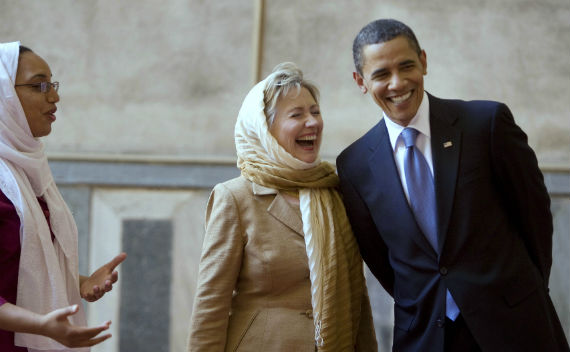More Questions Than Answers in Secretary Clinton’s Remarks on the Arab Uprisings
More on:

Secretary of State Clinton’s speech last night sought to answer questions about U.S. policy toward the Arab uprisings. Clinton posed six questions about developments in the region and U.S. policy, such as whether the United States believes democratic change is a national interest, why the United States promotes democracy inconsistently throughout the region, and how the United States will react to the victory of religious parties. While the speech touched on most of the bases, it left some of the most critical policy questions unanswered. She commented on a number of key issues:
– reaffirmation of the “Freedom Agenda” and America’s commitment to democracy in the Middle East, exclaiming “What a year 2011 has been for freedom in the Middle East”
– a tough love call for Bahrain to adopt forthcoming recommendations by an independent commission of inquiry and to pursue dialogue, reconciliation and concrete reforms
– an explicit call for Saudi Arabia to opt for democratic reform
– a headline grabbing pledge for the United States to work with the Islamist al-Nahda party in Tunisia
– an oblique reference for the need of “unelected officials” (read: the military) in Egypt to relinquish their role as the most powerful political force lest they plant the seeds for future unrest
– the important observation that elections are not the measure of democracy, but rather strong civil societies, respect for the rule of law, and independent institutions are
– a call for terrorist groups to disarm: “Legitimate political parties cannot have a militia wing and a political wing”
– a clear definition of U.S. interests in the Middle East that includes democratic change, defense of allies, and a secure supply of energy
One of the consequences of Secretary of State Clinton’s speech will be for people in the Middle East to conclude that the United States now endorses Islamist parties. She started off by saying “not all Islamists are alike” and noted that political parties—be they Christian, Hindu, Jewish or Muslim—respect rules of democratic politics. That is, she said, “what parties call themselves is less important than what they do”—respect freedom of speech and the rule of law, reject violence, and relinquish power if defeated at the polls.
Was the intent to suggest a major policy shift toward Islamist parties? Indeed, I’ve been hearing recently from Arab friends in the Middle East that many people believe the United States has already shifted its position toward support for Islamist parties. That may be the result of Washington’s announced intent to talk to Egypt’s Muslim Brotherhood and the recent Shalit deal that was concluded with the Brotherhood’s affiliate Hamas. Secretary Clinton’s speech will reinforce that perception.
Several other important questions were left unanswered:
First, why did the secretary see the need to give this speech right now? President Obama presented the administration’s views on the Arab uprisings in his May 19 speech at the State Department—Secretary Clinton’s home turf. One answer seems to be that through her travels, Clinton has subsequently encountered considerable skepticism about the United States’ intentions and aspirations in the Middle East, and considerable befuddlement about inconsistencies across the board.
If indeed the goal of the speech was to reach out to the Arab world and clarify Washington’s positions in a way that President Obama’s speech did not, then her speech makes sense. It suggests that despite the impenetrable bubble in which secretaries of state travel and conduct foreign policy, public views in the region have had an effect. It is not surprising that the skeptical questions that journalists and civil society activists have been posing to her and her aides seem to have touched her.
Second, what is the United States going to do about Syria and Iran? While she was critical of both regimes, she did not even hint at policies to come.
Third, Secretary Clinton deferred the answer to the question: what is the United States going to do in the future throughout the region to support change? Toward the end of her remarks, she said:
Along with our economic and technical help, America will also use our presence, influence and global leadership to support change. And later this week, I am issuing new policy guidance to structure our efforts across the region.
Just what that policy guidance will be remains the most important question yet to be answered by the Obama administration.
More on:
 Online Store
Online Store
